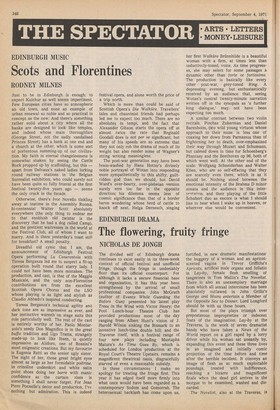EDINBURGH MUSIC
Scots and Florentines
RODNEY MILNES
Just to be in Edinburgh is enough; to expect Kulchur as well seems impertinent. Few European cities have so atmospheric an old town, and none an example of urban renewal so noble and so practical in concept as the new. And there's something rather solid about a city where all the banks are designed to look like temples, and indeed whose main thoroughfare (George Street, not the sadly vandalised Princes Street) has a bank at one end and a church at the other, which is some sort of portentous summing-up of our civilization. My faith in eternal changelessness is somewhat shaken by seeing the Castle Rock propped up by scaffolding, but this — apart from Delvaux's naked ladies lurking round railway stations in the Belgian Surrealist exhibition, who could surely not have been quite so fully frontal at the first festival twenty-five years ago — seems the only crack in the facade.
Otherwise, there's Ivor Novello tinkling away at teatime in the Assembly Rooms, bi-centennial Walter Scott absolutely everywhere (the only thing to endear me to that snobbish old twister is the discovery that he had a dog called Camp), and the prettiest waitresses in the world at the Festival Club, all of whom I want to marry. And is there yesterday's toast still for breakfast? A small penalty.
Dreadful old cynic that I am, the announcement of Edinburgh Festival Opera performing La Cenerentola with Teresa Berganza led me to suspect a fit-up operation built round that starry lady. I could not have been more mistaken. The production, and cast, is that of the Maggio Musicale, and the only non-Florentine contributions are from the excellent Scottish Opera Chorus and the LSO whose playing is as light and stylish as Claudio Abbado's inspired conducting.
Teresa Berganza's technical agility and dark tone are as impressive as ever, and her instinctive warmth on stage suits this role particularly well. The rest of the cast is entirely worthy of her. Paolo Montarsolo's seedy Don Magnifico is in the great buffo tradition and Ugo Trama, strangely made-up to look like Ibsen, is quietly impressive as Alidoro, one of Rossini's most enigmatic creations, But my favourite is Eugenia Ratti as the senior ugly sister. The sight of her, those great bright eyes almost as large as her formidable poitrine. in crinoline underskirt and white satin point shoes doing her barre with manic confidence as the curtain rises is something I shall never forget. For Jean Piero Ponnelle's decor and production, I've nothing but admiration. This is indeed
festival opera, and alone worth the price of a trip north.
Which is more than could be said of Scottish Opera's Die Walletire. Travellers' tales and chauvinist friends had perhaps led me to expect too much. There are no absolutes in tempi, and the fact that Alexander Gibson starts the opera off at almost twice the rate that Reginald Goodall does is not per se significant, but many of his speeds are so extreme that they not only rob the drama of much of its weight but also render some of Wagner's string writing meaningless.
The post-war generation may have been brain-washed by Hans Hotter's divinely noble portrayal of Wotan into responding more sympathetically to this shifty, guiltridden god than we should, but David Ward's over-hearty, over-plebeian version surely errs too far in the opposite direction; his dilemma seems less of cosmic significance than that of a border baron wondering whose herd of cattle to knock off next. Helga Dernesch, singing
her first Walhiire Briinnhilde is a beautiful woman with a firm, at times less than seductively-toned, voice. As time progresses, she may select for some passages a dynamic other than forte or fortissimo. The production is basically like every other post-war, grey-toned Ring. A depressing evening, but enthusiastically received by an audience that, seeing Wotan's central twenty-minute narration written off in the synopsis as 'a further long dialogue,' may not have been expecting too much.
A similar contrast between two violin recitals. Pinchas Zukerman and Daniel Barenboim, two wild young virtuosi whose approach to their muse is less one of coaxing her down from Parnassus than of frightening her to death, over-emphasized their way through Mozart and Schumann, but calmed down in time for Schoenberg's Phantasy and the Beethoven op 96, both of which went well. At the other end of the scale: Wolfgang Schneiderhan and Walter Klien, who are so self-effacing that they are scarcely even there, which is as it should be. Nothing stood between the emotional intensity of the Brahms D minor sonata and the audience in this intern,-‘,!tation, and their playing of the little Schubert duo as encore is what I should like to hear when I wake up in heaven, or wherever else would be convenient.


































 Previous page
Previous page